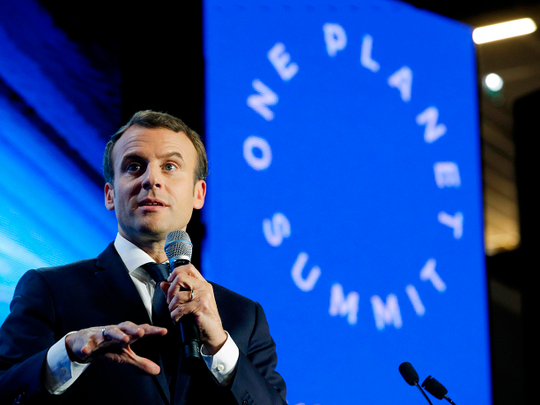
Paris: Moving to fill a climate science gap in Donald Trump’s America, French President Emmanuel Macron named 13 US researchers Monday to be hosted and sponsored by France to help “Make Our Planet Great Again”.
They were among 18 beneficiaries of a Macron-led initiative to boost climate change research in the face of Trump’s rejection of the Paris Agreement to limit climate change.
“I do want to thank you for being here, for your answer to this first call, your decision to move and come to Paris,” the French leader told the chosen few at an event dubbed: “Tech for Planet” held on the eve of his “One Planet Summit”.
“One of our main perspectives is obviously to address the current challenges of climate change,” he said, but also “to boost your research, to boost your initiatives, and to be sure that here you have help in order to deliver more rapidly and to do more.”
Macron has earmarked 30 million euros (Dh130 million) for his “Make our Planet Great Again” initiative — a play on Donald Trump’s “Make America Great Again” campaign slogan.
Macron made the offer after Trump, who has dismissed climate change as a “hoax”, announced in June the United States would withdraw from the Paris pact, painstakingly negotiated by nearly 200 nations over more than two decades.
The US is the only country to reject the agreement.
Furthermore, Trump has asked Congress to slash the climate research budgets of federal agencies, threatening billions of dollars and thousands of jobs.
Macron’s 30-million-euro pledge has since been matched by French universities and institutions, enough to pay for five-year postings for 50 scientists. More beneficiaries will be chosen later.
Junior researchers will be allotted up to one million euros over four years, covering their salaries, two doctoral students, and expenses.
Senior researchers will each have a 1.5-million-euro budget that provides for two assistants and two students. Spouses will be given French work permits.
$100 billion
“Make Our Planet Great Again is an unexpected opportunity,” Alessandra Giannini, a researcher at The Earth Institute at Columbia University, one of the 18 recipients, told AFP.
For fellow beneficiary Nuria Teixido of Stanford University, the initiative was an important recognition “that science plays an important role” in confronting the problem of climate change.
Tuesday’s summit will gather leaders including UN chief Antonio Guterres, Mexico’s Enrique Pena Nieto, Theresa May of Britain, Spain’s Mariano Rajoy, and European Commission President Jean-Claude Juncker to talk about climate finance.
It follows just weeks after the 23rd annual Conference of Parties to the UN Climate Convention, which was held in Bonn.
The US president’s rejection of the Paris pact threw a long shadow over the talks in Germany, where officials from Washington defended the use of fossil fuels blamed for global warming.
Trump was not invited to the latest talks, and Washington will be represented by an embassy official.
The gathering will look at sources of finance, public and private, to help countries make the costly shift to cleaner energy sources and to raise their defences against climate change impacts such as sea-level rise, harsher droughts, floods and superstorms, and disease spread.
Rich nations have pledged to muster $100 billion (Dh367 billion) in climate finance for developing nations per year from 2020.
On 2015 trends, total public financing would reach about $67 billion by that date, according to a report of the Organisation for Economic Cooperation and Development (OECD).
Trump has said the United States — which had pledged $3 billion towards the Green Climate Fund, of which it delivered $1 billion under Barack Obama — would not fulfil its climate finance commitments.
On Monday, UN climate chief Patricia Espinosa said “a practical path forward for finance is needed” if climate change is to be braked.
Political agreements “will not be enough if we do not update and reset the global finance architecture and make all development low-emission, resilient and sustainable,” she said.












